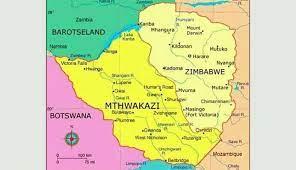Opinion / Columnist
Zimbabwe's Two-State Dilemma: Unveiling the marginalization of Matabeleland
13 Dec 2023 at 07:29hrs |
0 Views

In the heart of southern Africa, Zimbabwe stands as a nation marred by a tumultuous history, marked by colonial oppression, independence struggles, and a post-colonial era fraught with political turmoil. At the core of Zimbabwe's challenges lies a pressing issue that demands international attention and resolution – the marginalization of Matabeleland and the persistent debate over a two-state solution.
Historical Roots of Marginalization:
Zimbabwe's modern-day boundaries were drawn during the colonial era, resulting in a heterogeneous nation comprised of diverse ethnic groups. The marginalized region of Matabeleland, predominantly inhabited by the Ndebele people, has long borne the brunt of political and economic marginalization.
The early 1980s witnessed a brutal crackdown known as the Gukurahundi, where government forces unleashed violence against perceived dissidents, primarily concentrated in Matabeleland. This tragic episode further deepened the historical wounds, fostering a climate of mistrust and animosity between the central government and the Ndebele people.
The Economic Disparities:
Matabeleland continues to grapple with economic disparities, as resources and development projects disproportionately favor the dominant ethnic group in the north – the Shona. The inequitable distribution of resources exacerbates the socio-economic challenges faced by the people of Matabeleland, perpetuating a cycle of poverty and underdevelopment.
The Call for a Two-State Solution:
The notion of a two-state solution, reminiscent of the Israeli-Palestinian conflict, has gained traction among proponents seeking to address Zimbabwe's internal divisions. Advocates argue that a separate state for Matabeleland would allow for self-determination, enabling the region to govern its affairs and allocate resources independently.
Challenges and Resistance:
However, the proposal for a two-state solution faces substantial challenges. The central government vehemently opposes any move towards secession, citing the need for national unity. Critics argue that such a solution could further fragment an already fragile nation, risking internal strife and potential external intervention.
International Community's Role:
The international community plays a crucial role in mediating the tensions surrounding Zimbabwe's two-state dilemma. Diplomatic efforts, backed by organizations like the United Nations, should focus on fostering dialogue between the government and Matabeleland leaders. A balanced and inclusive approach that considers the concerns of all stakeholders is essential to finding a sustainable resolution.
Conclusion:
The marginalization of Matabeleland remains a poignant issue in Zimbabwe, challenging the nation's commitment to unity in diversity. A careful examination of historical injustices, economic disparities, and political grievances highlights the urgency of addressing these deep-seated problems. While a two-state solution may seem radical, it underscores the need for a comprehensive and inclusive dialogue that ensures the equitable participation of all Zimbabweans in shaping the nation's future. The path to reconciliation and unity requires a collective commitment to justice, equality, and a shared vision for a Zimbabwe that embraces the richness of its diversity.
Josh Mhambi is the Founding Chairpersp of ZAPU 2000 formed in 1999
Historical Roots of Marginalization:
Zimbabwe's modern-day boundaries were drawn during the colonial era, resulting in a heterogeneous nation comprised of diverse ethnic groups. The marginalized region of Matabeleland, predominantly inhabited by the Ndebele people, has long borne the brunt of political and economic marginalization.
The early 1980s witnessed a brutal crackdown known as the Gukurahundi, where government forces unleashed violence against perceived dissidents, primarily concentrated in Matabeleland. This tragic episode further deepened the historical wounds, fostering a climate of mistrust and animosity between the central government and the Ndebele people.
The Economic Disparities:
Matabeleland continues to grapple with economic disparities, as resources and development projects disproportionately favor the dominant ethnic group in the north – the Shona. The inequitable distribution of resources exacerbates the socio-economic challenges faced by the people of Matabeleland, perpetuating a cycle of poverty and underdevelopment.
The Call for a Two-State Solution:
The notion of a two-state solution, reminiscent of the Israeli-Palestinian conflict, has gained traction among proponents seeking to address Zimbabwe's internal divisions. Advocates argue that a separate state for Matabeleland would allow for self-determination, enabling the region to govern its affairs and allocate resources independently.
Challenges and Resistance:
However, the proposal for a two-state solution faces substantial challenges. The central government vehemently opposes any move towards secession, citing the need for national unity. Critics argue that such a solution could further fragment an already fragile nation, risking internal strife and potential external intervention.
International Community's Role:
The international community plays a crucial role in mediating the tensions surrounding Zimbabwe's two-state dilemma. Diplomatic efforts, backed by organizations like the United Nations, should focus on fostering dialogue between the government and Matabeleland leaders. A balanced and inclusive approach that considers the concerns of all stakeholders is essential to finding a sustainable resolution.
Conclusion:
The marginalization of Matabeleland remains a poignant issue in Zimbabwe, challenging the nation's commitment to unity in diversity. A careful examination of historical injustices, economic disparities, and political grievances highlights the urgency of addressing these deep-seated problems. While a two-state solution may seem radical, it underscores the need for a comprehensive and inclusive dialogue that ensures the equitable participation of all Zimbabweans in shaping the nation's future. The path to reconciliation and unity requires a collective commitment to justice, equality, and a shared vision for a Zimbabwe that embraces the richness of its diversity.
Josh Mhambi is the Founding Chairpersp of ZAPU 2000 formed in 1999
Source - Josh Mhambi
All articles and letters published on Bulawayo24 have been independently written by members of Bulawayo24's community. The views of users published on Bulawayo24 are therefore their own and do not necessarily represent the views of Bulawayo24. Bulawayo24 editors also reserve the right to edit or delete any and all comments received.
Join the discussion
Loading comments…

































